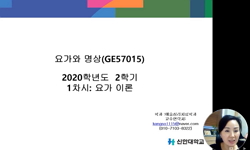The purpose of this study was to develope a psychological well-being improvement program applying mindfulness meditation for the high school students. The process of this study was as follows: First, after reviewing the literature on mindfulness medit...
http://chineseinput.net/에서 pinyin(병음)방식으로 중국어를 변환할 수 있습니다.
변환된 중국어를 복사하여 사용하시면 됩니다.
- 中文 을 입력하시려면 zhongwen을 입력하시고 space를누르시면됩니다.
- 北京 을 입력하시려면 beijing을 입력하시고 space를 누르시면 됩니다.

마음챙김 명상을 활용한 고등학생의 심리적 안녕감 증진 프로그램 개발 = The Development of a Psychological Well-Being Improvement Program Applying Mindfulness Meditation for High School Students
한글로보기https://www.riss.kr/link?id=A82569690
- 저자
- 발행기관
- 학술지명
- 권호사항
-
발행연도
2009
-
작성언어
-
- 주제어
-
KDC
300
-
등재정보
KCI등재
-
자료형태
학술저널
-
수록면
213-243(31쪽)
-
KCI 피인용횟수
12
- DOI식별코드
- 제공처
-
0
상세조회 -
0
다운로드
부가정보
다국어 초록 (Multilingual Abstract)
The purpose of this study was to develope a psychological well-being improvement program applying mindfulness meditation for the high school students. The process of this study was as follows: First, after reviewing the literature on mindfulness meditation, psychological well-being, and psychological well-being improvement programs and surveying the needs of high school students and teachers, the factors of the program were extracted. And then the program was constructed. Lastly, the program was corrected according to professionals` consultation and the results of pilot administration. The program consist of ten sessions including a psychological well-being improvement activities and mindfulness meditation training. Thirty students were randomly assigned into an experimental group, a comparative group, and a control group consisting of 10 students each. The results showed that the scores of subjective well-bing and psychological well-being were increased significantly in the experimental group comparing with the comparative group and the control group.
참고문헌 (Reference)
1 Hoggard, L, "행복: 영국 BBC 다큐멘터리" 예담 2006
2 Ben-Shahar, T, "해피어: 하버드대 행복학 강의" 위즈덤하우스 2007
3 배재홍, "한국형 마음챙김 명상에 기반한 스트레스감소 프로그램이 대학생의 정서반응에 미치는 영향" 한국건강심리학회 11 (11): 673-688, 2006
4 배재홍, "한국형 마음챙김 명상에 기반한 스트레스 감소 프로그램이 대학생의 정서 반응성에 미치는 영향" 영남대학교 2007
5 차경호, "한국과 미국대학생의 주관적 안녕감과 심리적 안녕감의 관계" 한국청소년학회 11 (11): 321-337, 2004
6 류정희, "청소년의 심리적, 사회적 안녕감: 그 구조 및 주관적 안녕감과의 관계" 4 (4): 55-77, 2007
7 배성애, "청소년의 심리적 안녕감과 관련된 인지적 요인들에 관한 탐색연구" 경남대학교 1998
8 박정희, "청소년의 심리적 안녕감 증진을 위한 학급단위 학교상담 프로그램의 개발 및 효과검증" 부산대학교 2007
9 전신현, "청소년의 삶의 질에 관한 경험적 연구" 25 (25): 63-82, 1996
10 이경란, "정서표현성과 사회적 문제해결능력이 대학생의 주관적 안녕감에 미치는 영향" 가톨릭대학교 2006
1 Hoggard, L, "행복: 영국 BBC 다큐멘터리" 예담 2006
2 Ben-Shahar, T, "해피어: 하버드대 행복학 강의" 위즈덤하우스 2007
3 배재홍, "한국형 마음챙김 명상에 기반한 스트레스감소 프로그램이 대학생의 정서반응에 미치는 영향" 한국건강심리학회 11 (11): 673-688, 2006
4 배재홍, "한국형 마음챙김 명상에 기반한 스트레스 감소 프로그램이 대학생의 정서 반응성에 미치는 영향" 영남대학교 2007
5 차경호, "한국과 미국대학생의 주관적 안녕감과 심리적 안녕감의 관계" 한국청소년학회 11 (11): 321-337, 2004
6 류정희, "청소년의 심리적, 사회적 안녕감: 그 구조 및 주관적 안녕감과의 관계" 4 (4): 55-77, 2007
7 배성애, "청소년의 심리적 안녕감과 관련된 인지적 요인들에 관한 탐색연구" 경남대학교 1998
8 박정희, "청소년의 심리적 안녕감 증진을 위한 학급단위 학교상담 프로그램의 개발 및 효과검증" 부산대학교 2007
9 전신현, "청소년의 삶의 질에 관한 경험적 연구" 25 (25): 63-82, 1996
10 이경란, "정서표현성과 사회적 문제해결능력이 대학생의 주관적 안녕감에 미치는 영향" 가톨릭대학교 2006
11 이수일, "정서의 체험 및 표현성이 건강과 심리적 안녕에 미치는 영향" 11 (11): 117-135, 1997
12 원 두 리, "심리적 웰빙을 어떻게 추구할 것인가: 웰빙에 영향을 주는 요소들에 대한 탐색" 한국건강심리학회 11 (11): 125-145, 2006
13 김명소, "심리적 안녕감의 구성개념분석: 한국 성인 남녀를 중심으로" 15 (15): 19-39, 2001
14 류연지, "성격 및 욕구 수준이 주관적 안녕에 미치는 영향" 연세대학교
15 최윤선, "부정적인 신체상을 가진 여대생을 위한 마음챙김 명상 프로그램과 인지행동 프로그램의 효과 비교" 한국심리학회 224-225, 2006
16 배재홍, "마음챙김명상 프로그램이 대학생의 시험불안에 미치는 효과" 한국심리학회 96-97, 2006a
17 김정모, "마음챙김명상 인지치료 프로그램이 청소년 수형자의 공격성에 미치는 효과" 한국심리학회 94-95, 2006
18 원두리, "마음챙김,의미부여 및 자율적 행동조절이 심리적 웰빙에 미치는 영향" 충남대학교 2007
19 Segal, Z. V, "마음챙김 명상에 기초한 인지치료: 우울증 재발 방지를 위한 새로운 치료법" 학지사 2006
20 Kabat-Zinn,J, "마음챙김 명상과 자기치유: 상, 하" 학지사 2005
21 김명소, "대학생의 ��바람직한 삶’ 구성요인 및 주관적 안녕감과의 관계 분석: 남녀 차이를 중심으로" 한국여성심리학회 8 (8): 83-97, 2003
22 김경순, "대학생의 심리적 안녕감 증진을 위한 프로그램 개발과 적용" 경성대학교 2006
23 한정균, "뇌호흡명상과 인지치료가 고등학생의우울 증상 개선에 미치는 효과" 한국상담심리학회 17 (17): 855-876, 2005
24 권석만, "긍정심리학:행복의 과학적 탐구" 학지사 2008
25 Seligman, M. E. P, "긍정 심리학: 진정한 행복 만들기" 물푸레 2006
26 Compton,W.C, "긍정 심리학 입문" 박학사 2007
27 차경호, "고등학생들의 주관적 안녕감과 심리적 변인과의 관계" 23 : 157-177, 2004
28 King, L. A, "What makes life good?" 75 : 156-165, 1998
29 Fava, G. A, "Well-being therapy: Conceptual and technical issues" 68 : 171-179, 1999
30 Bryant, F. B, "Using the past to enhance the present: Boosting happiness through positive reminiscence" 6 : 227-260, 2005
31 Keyes, C. L, "Toward a science of mental health: Positive directions in diagnosis and interventions. In:Handbook of positive psychology" Oxford University Press 45-59, 2005
32 Ryff, C. D, "The structure of psychological well- being revised" 69 (69): 719-727, 1995
33 Fredrickson,B.L, "The role of positive emotions in positive psychology: The broaden-and-build theory of positive emotions" 56 : 218-226, 2001
34 Ryff, C. D, "The contours of positive human health" 9 (9): 1-28, 1998
35 Dierendonck, D, "The construct validity of Ryff's Scales of Psychological Well-being and its extension with spiritual well-being" 36 : 629-643, 2005
36 Brown, K. W, "The benefits of being present: Mindfulness and its role in psychological well-being" 84 (84): 822-848, 2003
37 Diener, E, "The Satisfaction With Life Scale" 49 (49): 71-75, 1985
38 Diener, E, "Subjective well-being: Three decades of progress" 125 (125): 276-302, 1999
39 Diener,E, "Subjective well-being: The science of happiness and a proposal for a national index" 55 : 34-43, 2000
40 McGregor, I, "Personal projects, happiness, and meaning: On doing well and being yourself" 74 : 494-512, 1998
41 Ryan, R. M, "On happiness and human potentials: A review of research on hedonic and eudaimonic well-being" 52 : 141-166, 2001
42 Baer,R.A, "Mindfulness training as a clinical intervention: A conceptual & empirical review" 10 : 125-143, 2003
43 Smith, W, "Meditation as an adjunct to a happiness enhancement program" 51 (51): 269-273, 1995
44 Shapiro, L, "Meditation and positive psychology. In:Handbook of positive psychology" Oxford University Press 632-645, 2005
45 Lyubomirsky, S, "How to be happy: 행복도 연습이 필요하다" 지식노마드 2008
46 Ryff,C.D, "Happiness is everything, or is it? Explorations on the meaning of psychological well-being" 57 (57): 1069-1081, 1989
47 Compton, W, "Factor structure of mental health measures" 71 (71): 406-413, 1996
48 Fordyce,M.W, "Development of a program to increase personal happiness" 24 (24): 511-521, 1977
49 Fordyce,M.W, "A program to increase happiness: Further studies" 30 (30): 483-498, 1983
50 교육인적자원부, "2008 학생정신건강 관리 방안"
동일학술지(권/호) 다른 논문
-
기술교육에서 통합적인 노력에 대한 연구 경향: 관련 학술지의 고찰
- 경북대학교 중등교육연구소
- 권혁수 ( Hyuk Soo Kwon )
- 2009
- KCI등재
-
가설생성 과정에서 나타나는 학습자의 감성 및 생리적 변화와 가설생성능력의 상관관계 분석
- 경북대학교 중등교육연구소
- 권용주 ( Yong Ju Kwon )
- 2009
- KCI등재
-
부모-자녀 관계 사회적 자본과 교육포부 수준과의 관계: 초등학생을 중심으로
- 경북대학교 중등교육연구소
- 안우환 ( Wo Hwan An )
- 2009
- KCI등재
-
- 경북대학교 중등교육연구소
- 김종희 ( Jong Hee Kim )
- 2009
- KCI등재
분석정보
인용정보 인용지수 설명보기
학술지 이력
| 연월일 | 이력구분 | 이력상세 | 등재구분 |
|---|---|---|---|
| 2026 | 평가예정 | 재인증평가 신청대상 (재인증) | |
| 2020-01-01 | 평가 | 등재학술지 유지 (재인증) |  |
| 2017-01-01 | 평가 | 등재학술지 유지 (계속평가) |  |
| 2013-01-01 | 평가 | 등재학술지 유지 (등재유지) |  |
| 2010-03-24 | 학술지명변경 | 외국어명 : 미등록 -> SECONDARY EDUCATION RESEARCH |  |
| 2010-01-01 | 평가 | 등재학술지 유지 (등재유지) |  |
| 2007-01-01 | 평가 | 등재학술지 선정 (등재후보2차) |  |
| 2006-01-01 | 평가 | 등재후보 1차 PASS (등재후보1차) |  |
| 2004-07-01 | 평가 | 등재후보학술지 선정 (신규평가) |  |
학술지 인용정보
| 기준연도 | WOS-KCI 통합IF(2년) | KCIF(2년) | KCIF(3년) |
|---|---|---|---|
| 2016 | 1.63 | 1.63 | 1.42 |
| KCIF(4년) | KCIF(5년) | 중심성지수(3년) | 즉시성지수 |
| 1.38 | 1.27 | 1.781 | 0.13 |




 KCI
KCI KISS
KISS






